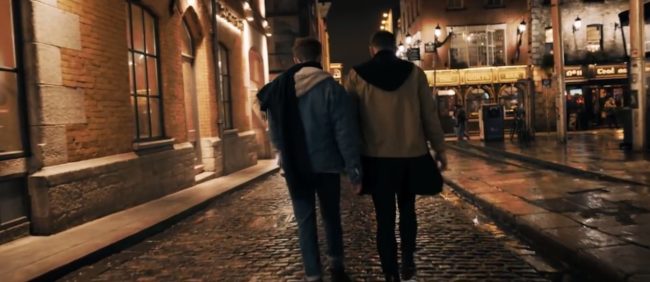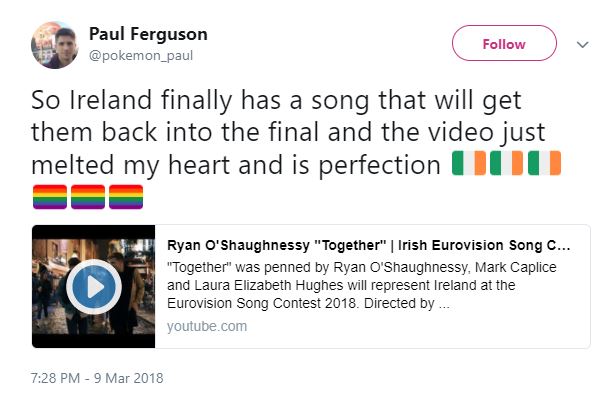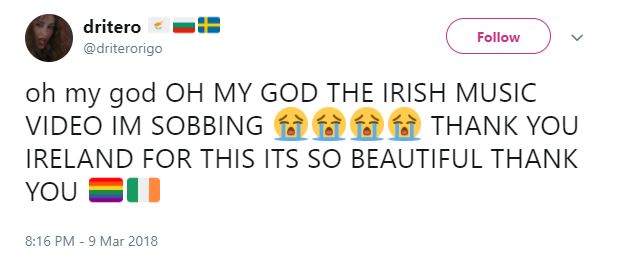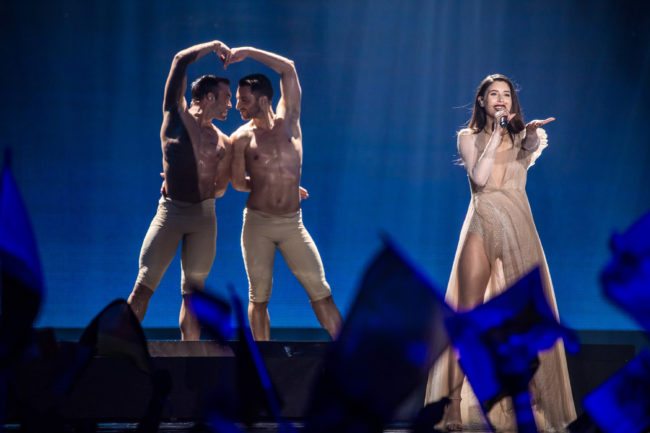Ireland’s Eurovision Song Contest entry features moving gay romance

Ireland has unveiled its entrant for the 2018 Eurovision Song Contest in Lisbon – and the music video features a moving same-sex romance.
The country has unveiled the track for the contest, with former Britain’s Got Talent finalist Ryan O’Shaughnessy set to represent Ireland with the song ‘Together’.
The song is a moving ballad following a painful break-up, with the forlorn singer reminiscing about their past romance.
The lyrics do not explicitly reference the gender of the lover, but the track’s official music video makes clear it is about a gay couple.

The clip features dancers Alan McGrath and Kevin O’Dwyer as a couple on a date walking through the streets of Dublin’s Temple Bar – before busting out in an emotional same-sex dance routine.
The video was directed by Christian Tierney, choreographed by Ciaran Connolly.
The music video has won praise from fans – who are hoping the track will end the once-dominant country’s losing streak at the contest, having failed to qualify for four years in a row.


One wrote: “So Ireland finally has a song that will get them back into the final and the video just melted my heart and is perfection ️ ️ ️ ”
Another added: “oh my god OH MY GOD THE IRISH MUSIC VIDEO IM SOBBING THANK YOU IRELAND FOR THIS ITS SO BEAUTIFUL THANK YOU”
Speaking to RTE, O’Shaughnessy said: “It was amazing seeing the video come to life in the way it did, sticking with the original concept that love is universal and there are testing moments in every relationship.
“I can’t wait for all Eurovision fans to hear the track and check out the video!”
He added: “For years my family has been involved in Eurovision. My uncle [Gary O’Shaughnessy] sung in 2001 for Ireland. It’s been in the pipeline.
“My mam said to me every year ‘you have to enter a song this year’ and I never really did. It was always kind of pushed back.”
The boss of the Eurovision Song Contest recently hinted at early plans for a spin-off contest that could feature all 50 US states.
The long-running show, often known as the ‘Gay World Cup’ has a massive LGBT audience of dedicated fans due to its notoriously camp nature.
But the show’s bosses are now hoping to spread their wings across the globe.
Following on from Eurovision’s debut in the United States on gay TV channel Logo, execs have hinted that a fully-fledged US spinoff is in the works.
Eurovision Executive Supervisor Jon Ola Sand, who runs the annual contest, said: “When it comes to the US we also have a deal there with the broadcaster Viacom to broadcast Eurovision in the US.
“We also want to see if it’s possible to create an American version of the Eurovision Song Contest, although we haven’t concluded that yet.
“This is a long-term strategy for sure to see how far outside of Europe the brand can reach.”
He also opened up about the recently-announced plans for a ‘Eurovision Asia’, which may see a raft of new countries compete in a separate spin-off contest.
Mr Ola Sand said: “We have already launched an initiative in Asia, and this is done in conjunction with our Australian partner, SBS, who participates in the ESC.
“We are working with them to stage a similar concept to Eurovision in Asia, essentially to have a Eurovision Asia.”
He hinted that Eurovision was building bridges in “several markets in that region”, including New Zealand and China.
It was recently confirmed that a spin-off Asian contest is in development, which could potentially draw in a whole new region, from India to South Korea, Japan and China.

A statement says: “The Greatest Song Contest on Earth is coming to Asia!
“With its brilliant pop stars, its glamorous fashion, and a huge passion for pop music, Asia and Eurovision are made for each other.
“We are taking the biggest live televised music show – Eurovision – to the biggest music audience in the world. Countries from the Asia-Pacific region will be able to compete in their own version of the Eurovision Song Contest for the first time.
“Each country will showcase their songwriting and performing talent to Asia and the world and compete to be crowned the winner of the first ever Eurovision Asia Song Contest.”

